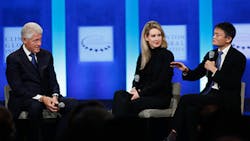Theranos Battles WSJ Allegations of Shaky Science
Earlier this month, we published a cover story that trumpeted Theranos founder and CEO Elizabeth Holmes as our Manufacturing Technology Leader of the Year. Her contributions to the industry seemed to merit the accolade, and if she could revolutionize blood testing, land FDA approval and develop new equipment in the process, she fit that title of tech leader.
Our timing was far from perfect. The Wall Street Journal published a story on the front page of its Thursday edition that, if true, tremendously damages Theranos and Holmes. Journal reporter John Carreyrou worked on the story for five months, starting with four former company employees and diving into both allegations and science. Among the worst reported claims:
Theranos runs the majority of its tests on traditional machines purchased from companies like Siemens AG, not on the patented Edison machine it manufactured. This would lay waste to Theranos’ claims of disruption and provide critics with another reason why Theranos is as secretive as it is.
Theranos is famous for its finger stick technology — which is far less painful than the tradition of sticking needles into arm veins and drawing vial after vial of blood — then running the tests on its own devices, but it might be running only about 30% of its 200 or so tests using that revolutionary process. The rest are done closer to the old-fashioned manner.
Theranos might also be diluting its test results into larger samples in order to be read by the aforementioned third-party machines. This process can further skew results.
Many of Theranos’ tests, especially simpler ones like potassium, calcium, glucose and protein, yielded markedly different results than hospital tests during a sample on one patient, and all were above the normal range.
When asked by a company employee about proficiency testing samples, Theranos president and COO Sunny Balwani reportedly responded in an email that “samples should have never run on Edisons to begin with” and that he later ordered employees to stop running tests on the Edisons.
Carreyrou also wrote in the story that he and the Journal attempted to talk with Holmes throughout the five-month reporting process, but were denied every time. Holmes responded Thursday night, during an interview with Jim Cramer on CNBC’s Mad Money:
“This is what happens when you work to change things,” Holmes said. “First, they think you’re crazy when you work to change things, then they fight you, and then all of a sudden, you change the world. … We are doing things differently, and we are working to make a difference, and that means people raise questions, and that’s OK.”
Theranos also responded, writing a post on its website that the story, which runs close to 4,000 words, is “factually and scientifically erroneous, and grounded in baseless assertions by inexperienced and disgruntled former employees and industry incumbents. … The sources relied on in the article today were never in a position to understand Theranos’ technology and know nothing about the processes currently employed by the company.
“Theranos presented the facts to this reporter to prove the accuracy and reliability of its tests and to directly refute these false allegations, including more than 1,000 pages of statements and documents. Disappointingly, the Journal chose to publish this article without even mentioning the facts Theranos shared that disproved the many falsehoods in the article.”
Holmes has complained recently that major companies like Quest Diagnostics and LabCorp have planted negative stories about her and Theranos in the press for more than a year. The biggest issues here, though, are not about planting stories:
How many tests does Theranos run on its own equipment? (FDA approval of its equipment is not required because it’s used only internally.)
How many tests can be run using the revolutionary finger stick and nanotainer technology?
Can Theranos continue to sell its tests at a far lower rate to Medicare and Medicaid?
Can Theranos, which has been valued around $9 billion, survive a potentially enormous upheaval of its business model and an even larger uprooting of the very science it trumpeted as a game-changer?
We stand by our selection of Holmes — so fresh that she’s still on the cover of our current issue — and hope she answers some questions. We’ve sent her the four listed above. We hope to hear from her soon.
Holmes is a fan of the late Steve Jobs, from the black uniform, to the firm leadership, to the code of secrecy that surrounds R&D and the rest of Theranos. She will have to relent, though. Sooner or later, she will have to pull back at least part of that veil.
About the Author
Matt LaWell
Staff Writer
Staff writer Matt LaWell explores news in manufacturing technology, covering the trends and developments in automation, robotics, digital tools and emerging technologies. He also reports on the best practices of the most successful high tech companies, including computer, electronics, and industrial machinery and equipment manufacturers.
Matt joined IndustryWeek in 2015 after six years at newspapers and magazines in West Virginia, North Carolina and Ohio, a season on the road with his wife writing about America and minor league baseball, and three years running a small business. He received his bachelor's degree in magazine journalism from Ohio University.
